2806NRS Annotated Bibliography: Applying Research to Heart Failure
VerifiedAdded on 2023/04/25
|10
|2466
|202
Annotated Bibliography
AI Summary
This annotated bibliography critically examines three research articles to inform the management of a 75-year-old patient, William, diagnosed with chronic heart failure, ischemic cardiomyopathy, and hypertension. The analysis focuses on the role of physical exercise in improving health-related quality of life and reducing hospitalization rates, the impact of psychological interventions on self-care and overall well-being, and the significance of patient education in enhancing medication adherence. The recommendations for clinical practice emphasize the importance of home-based personal clinical training, dietary education, person-centered care plans, and potential residential care settings to improve therapy adherence and overall health outcomes for older adults with cardiovascular disease. This assignment provides a robust foundation for evidence-based nursing practice in managing complex chronic conditions.

Annotated Bibliography
Name of the Student
Name of the University
Author Note
Name of the Student
Name of the University
Author Note
Paraphrase This Document
Need a fresh take? Get an instant paraphrase of this document with our AI Paraphraser
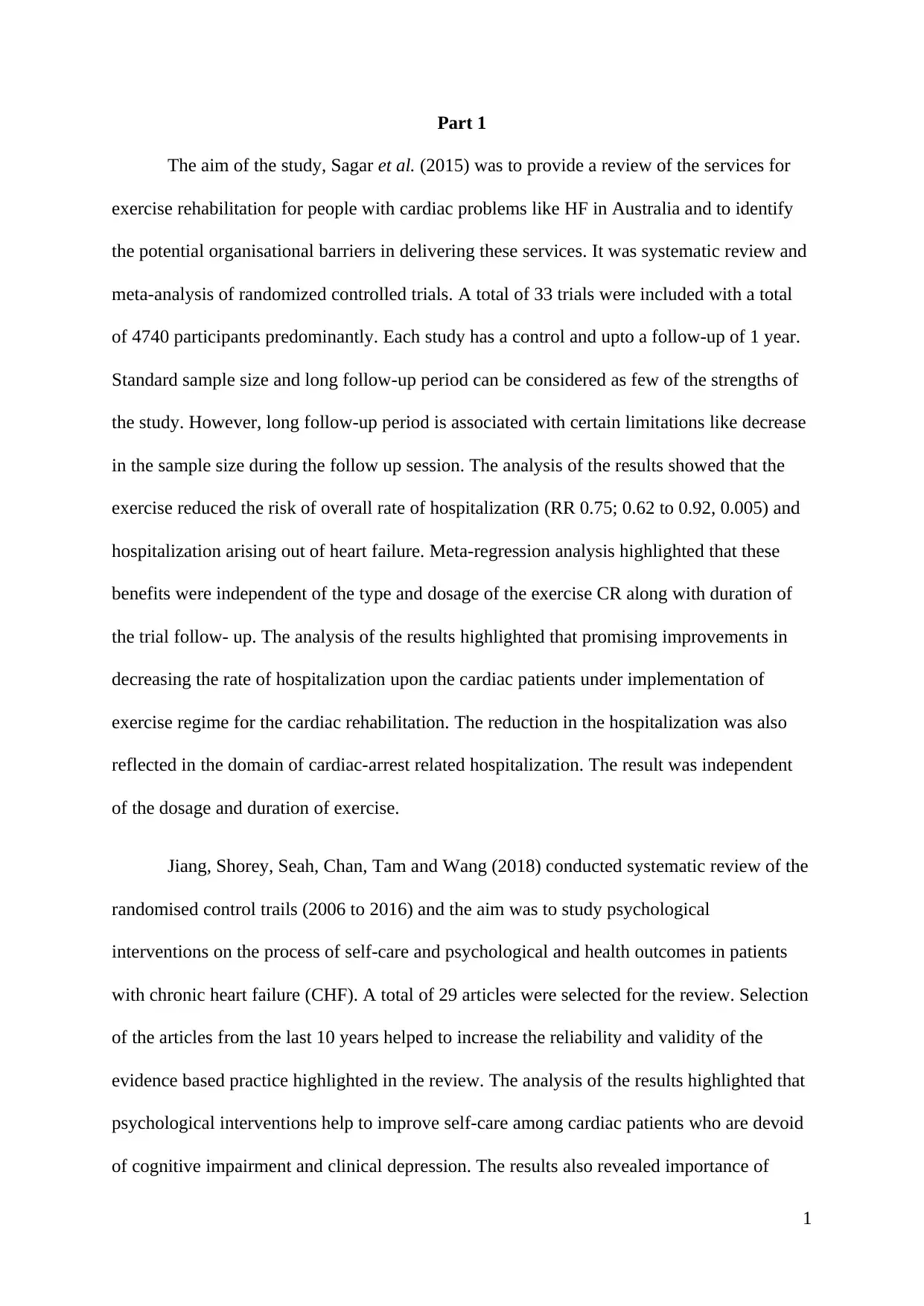
Part 1
The aim of the study, Sagar et al. (2015) was to provide a review of the services for
exercise rehabilitation for people with cardiac problems like HF in Australia and to identify
the potential organisational barriers in delivering these services. It was systematic review and
meta-analysis of randomized controlled trials. A total of 33 trials were included with a total
of 4740 participants predominantly. Each study has a control and upto a follow-up of 1 year.
Standard sample size and long follow-up period can be considered as few of the strengths of
the study. However, long follow-up period is associated with certain limitations like decrease
in the sample size during the follow up session. The analysis of the results showed that the
exercise reduced the risk of overall rate of hospitalization (RR 0.75; 0.62 to 0.92, 0.005) and
hospitalization arising out of heart failure. Meta-regression analysis highlighted that these
benefits were independent of the type and dosage of the exercise CR along with duration of
the trial follow- up. The analysis of the results highlighted that promising improvements in
decreasing the rate of hospitalization upon the cardiac patients under implementation of
exercise regime for the cardiac rehabilitation. The reduction in the hospitalization was also
reflected in the domain of cardiac-arrest related hospitalization. The result was independent
of the dosage and duration of exercise.
Jiang, Shorey, Seah, Chan, Tam and Wang (2018) conducted systematic review of the
randomised control trails (2006 to 2016) and the aim was to study psychological
interventions on the process of self-care and psychological and health outcomes in patients
with chronic heart failure (CHF). A total of 29 articles were selected for the review. Selection
of the articles from the last 10 years helped to increase the reliability and validity of the
evidence based practice highlighted in the review. The analysis of the results highlighted that
psychological interventions help to improve self-care among cardiac patients who are devoid
of cognitive impairment and clinical depression. The results also revealed importance of
1
The aim of the study, Sagar et al. (2015) was to provide a review of the services for
exercise rehabilitation for people with cardiac problems like HF in Australia and to identify
the potential organisational barriers in delivering these services. It was systematic review and
meta-analysis of randomized controlled trials. A total of 33 trials were included with a total
of 4740 participants predominantly. Each study has a control and upto a follow-up of 1 year.
Standard sample size and long follow-up period can be considered as few of the strengths of
the study. However, long follow-up period is associated with certain limitations like decrease
in the sample size during the follow up session. The analysis of the results showed that the
exercise reduced the risk of overall rate of hospitalization (RR 0.75; 0.62 to 0.92, 0.005) and
hospitalization arising out of heart failure. Meta-regression analysis highlighted that these
benefits were independent of the type and dosage of the exercise CR along with duration of
the trial follow- up. The analysis of the results highlighted that promising improvements in
decreasing the rate of hospitalization upon the cardiac patients under implementation of
exercise regime for the cardiac rehabilitation. The reduction in the hospitalization was also
reflected in the domain of cardiac-arrest related hospitalization. The result was independent
of the dosage and duration of exercise.
Jiang, Shorey, Seah, Chan, Tam and Wang (2018) conducted systematic review of the
randomised control trails (2006 to 2016) and the aim was to study psychological
interventions on the process of self-care and psychological and health outcomes in patients
with chronic heart failure (CHF). A total of 29 articles were selected for the review. Selection
of the articles from the last 10 years helped to increase the reliability and validity of the
evidence based practice highlighted in the review. The analysis of the results highlighted that
psychological interventions help to improve self-care among cardiac patients who are devoid
of cognitive impairment and clinical depression. The results also revealed importance of
1
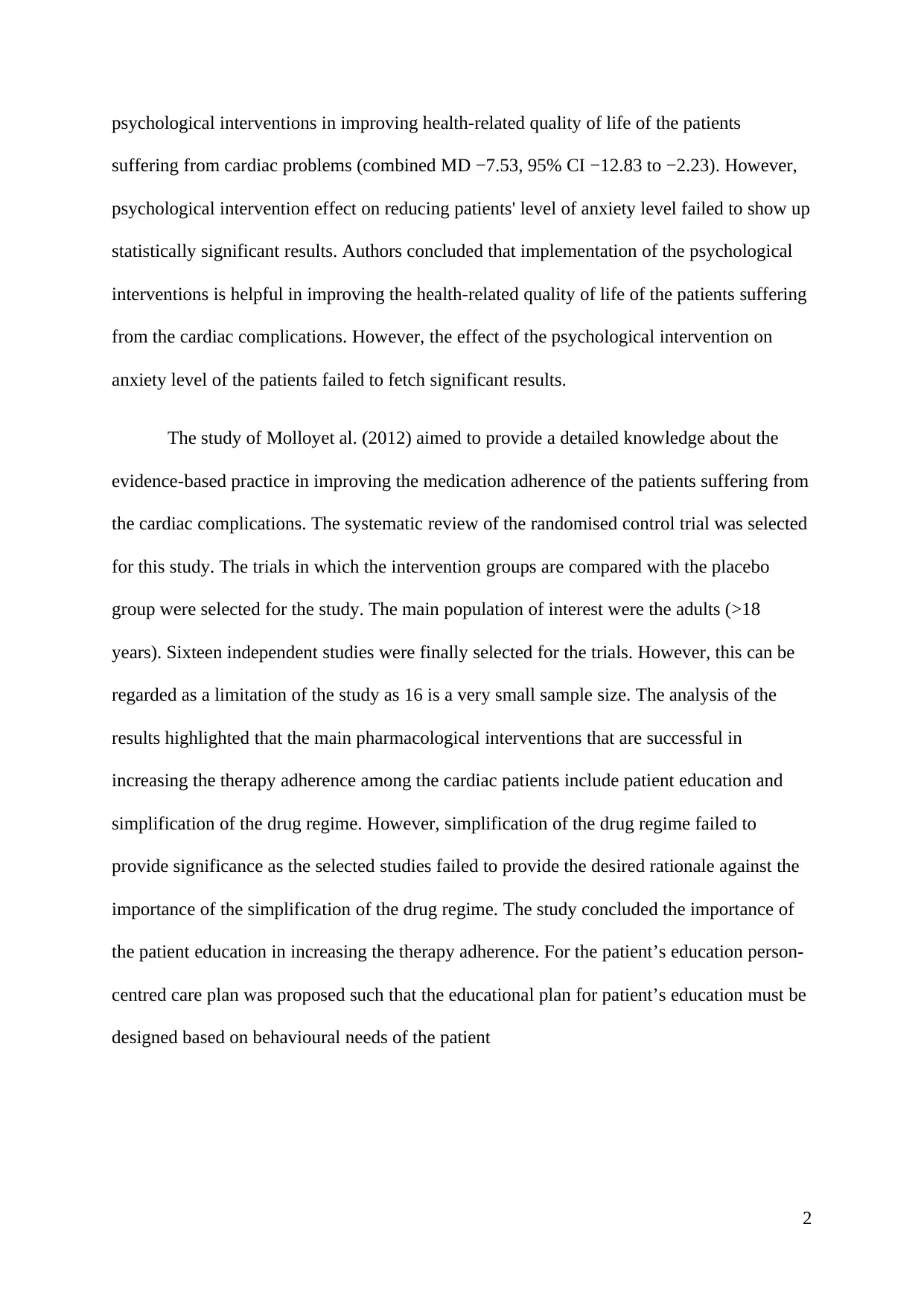
psychological interventions in improving health-related quality of life of the patients
suffering from cardiac problems (combined MD −7.53, 95% CI −12.83 to −2.23). However,
psychological intervention effect on reducing patients' level of anxiety level failed to show up
statistically significant results. Authors concluded that implementation of the psychological
interventions is helpful in improving the health-related quality of life of the patients suffering
from the cardiac complications. However, the effect of the psychological intervention on
anxiety level of the patients failed to fetch significant results.
The study of Molloyet al. (2012) aimed to provide a detailed knowledge about the
evidence-based practice in improving the medication adherence of the patients suffering from
the cardiac complications. The systematic review of the randomised control trial was selected
for this study. The trials in which the intervention groups are compared with the placebo
group were selected for the study. The main population of interest were the adults (>18
years). Sixteen independent studies were finally selected for the trials. However, this can be
regarded as a limitation of the study as 16 is a very small sample size. The analysis of the
results highlighted that the main pharmacological interventions that are successful in
increasing the therapy adherence among the cardiac patients include patient education and
simplification of the drug regime. However, simplification of the drug regime failed to
provide significance as the selected studies failed to provide the desired rationale against the
importance of the simplification of the drug regime. The study concluded the importance of
the patient education in increasing the therapy adherence. For the patient’s education person-
centred care plan was proposed such that the educational plan for patient’s education must be
designed based on behavioural needs of the patient
2
suffering from cardiac problems (combined MD −7.53, 95% CI −12.83 to −2.23). However,
psychological intervention effect on reducing patients' level of anxiety level failed to show up
statistically significant results. Authors concluded that implementation of the psychological
interventions is helpful in improving the health-related quality of life of the patients suffering
from the cardiac complications. However, the effect of the psychological intervention on
anxiety level of the patients failed to fetch significant results.
The study of Molloyet al. (2012) aimed to provide a detailed knowledge about the
evidence-based practice in improving the medication adherence of the patients suffering from
the cardiac complications. The systematic review of the randomised control trial was selected
for this study. The trials in which the intervention groups are compared with the placebo
group were selected for the study. The main population of interest were the adults (>18
years). Sixteen independent studies were finally selected for the trials. However, this can be
regarded as a limitation of the study as 16 is a very small sample size. The analysis of the
results highlighted that the main pharmacological interventions that are successful in
increasing the therapy adherence among the cardiac patients include patient education and
simplification of the drug regime. However, simplification of the drug regime failed to
provide significance as the selected studies failed to provide the desired rationale against the
importance of the simplification of the drug regime. The study concluded the importance of
the patient education in increasing the therapy adherence. For the patient’s education person-
centred care plan was proposed such that the educational plan for patient’s education must be
designed based on behavioural needs of the patient
2
⊘ This is a preview!⊘
Do you want full access?
Subscribe today to unlock all pages.

Trusted by 1+ million students worldwide
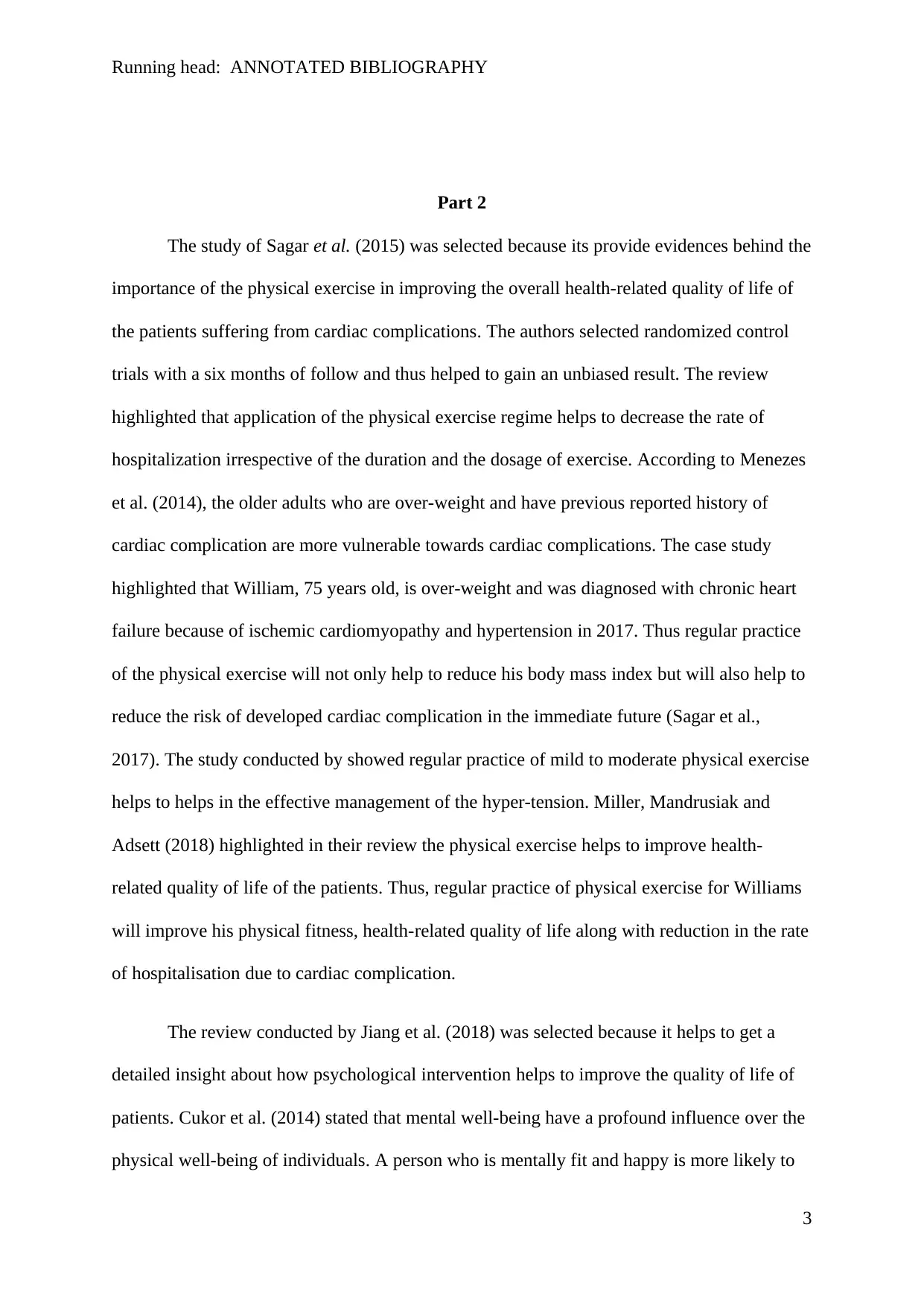
Running head: ANNOTATED BIBLIOGRAPHY
Part 2
The study of Sagar et al. (2015) was selected because its provide evidences behind the
importance of the physical exercise in improving the overall health-related quality of life of
the patients suffering from cardiac complications. The authors selected randomized control
trials with a six months of follow and thus helped to gain an unbiased result. The review
highlighted that application of the physical exercise regime helps to decrease the rate of
hospitalization irrespective of the duration and the dosage of exercise. According to Menezes
et al. (2014), the older adults who are over-weight and have previous reported history of
cardiac complication are more vulnerable towards cardiac complications. The case study
highlighted that William, 75 years old, is over-weight and was diagnosed with chronic heart
failure because of ischemic cardiomyopathy and hypertension in 2017. Thus regular practice
of the physical exercise will not only help to reduce his body mass index but will also help to
reduce the risk of developed cardiac complication in the immediate future (Sagar et al.,
2017). The study conducted by showed regular practice of mild to moderate physical exercise
helps to helps in the effective management of the hyper-tension. Miller, Mandrusiak and
Adsett (2018) highlighted in their review the physical exercise helps to improve health-
related quality of life of the patients. Thus, regular practice of physical exercise for Williams
will improve his physical fitness, health-related quality of life along with reduction in the rate
of hospitalisation due to cardiac complication.
The review conducted by Jiang et al. (2018) was selected because it helps to get a
detailed insight about how psychological intervention helps to improve the quality of life of
patients. Cukor et al. (2014) stated that mental well-being have a profound influence over the
physical well-being of individuals. A person who is mentally fit and happy is more likely to
3
Part 2
The study of Sagar et al. (2015) was selected because its provide evidences behind the
importance of the physical exercise in improving the overall health-related quality of life of
the patients suffering from cardiac complications. The authors selected randomized control
trials with a six months of follow and thus helped to gain an unbiased result. The review
highlighted that application of the physical exercise regime helps to decrease the rate of
hospitalization irrespective of the duration and the dosage of exercise. According to Menezes
et al. (2014), the older adults who are over-weight and have previous reported history of
cardiac complication are more vulnerable towards cardiac complications. The case study
highlighted that William, 75 years old, is over-weight and was diagnosed with chronic heart
failure because of ischemic cardiomyopathy and hypertension in 2017. Thus regular practice
of the physical exercise will not only help to reduce his body mass index but will also help to
reduce the risk of developed cardiac complication in the immediate future (Sagar et al.,
2017). The study conducted by showed regular practice of mild to moderate physical exercise
helps to helps in the effective management of the hyper-tension. Miller, Mandrusiak and
Adsett (2018) highlighted in their review the physical exercise helps to improve health-
related quality of life of the patients. Thus, regular practice of physical exercise for Williams
will improve his physical fitness, health-related quality of life along with reduction in the rate
of hospitalisation due to cardiac complication.
The review conducted by Jiang et al. (2018) was selected because it helps to get a
detailed insight about how psychological intervention helps to improve the quality of life of
patients. Cukor et al. (2014) stated that mental well-being have a profound influence over the
physical well-being of individuals. A person who is mentally fit and happy is more likely to
3
Paraphrase This Document
Need a fresh take? Get an instant paraphrase of this document with our AI Paraphraser
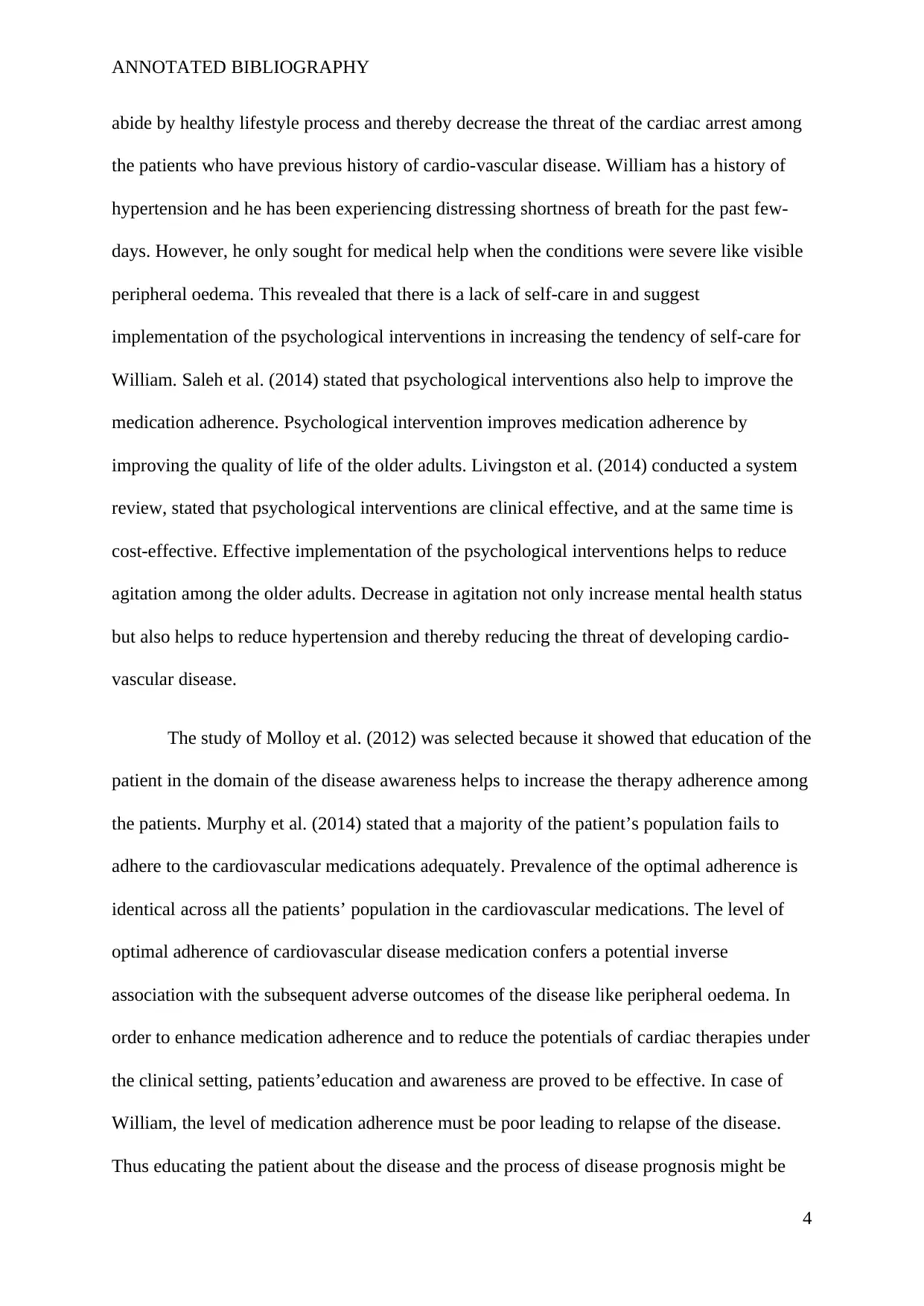
ANNOTATED BIBLIOGRAPHY
abide by healthy lifestyle process and thereby decrease the threat of the cardiac arrest among
the patients who have previous history of cardio-vascular disease. William has a history of
hypertension and he has been experiencing distressing shortness of breath for the past few-
days. However, he only sought for medical help when the conditions were severe like visible
peripheral oedema. This revealed that there is a lack of self-care in and suggest
implementation of the psychological interventions in increasing the tendency of self-care for
William. Saleh et al. (2014) stated that psychological interventions also help to improve the
medication adherence. Psychological intervention improves medication adherence by
improving the quality of life of the older adults. Livingston et al. (2014) conducted a system
review, stated that psychological interventions are clinical effective, and at the same time is
cost-effective. Effective implementation of the psychological interventions helps to reduce
agitation among the older adults. Decrease in agitation not only increase mental health status
but also helps to reduce hypertension and thereby reducing the threat of developing cardio-
vascular disease.
The study of Molloy et al. (2012) was selected because it showed that education of the
patient in the domain of the disease awareness helps to increase the therapy adherence among
the patients. Murphy et al. (2014) stated that a majority of the patient’s population fails to
adhere to the cardiovascular medications adequately. Prevalence of the optimal adherence is
identical across all the patients’ population in the cardiovascular medications. The level of
optimal adherence of cardiovascular disease medication confers a potential inverse
association with the subsequent adverse outcomes of the disease like peripheral oedema. In
order to enhance medication adherence and to reduce the potentials of cardiac therapies under
the clinical setting, patients’education and awareness are proved to be effective. In case of
William, the level of medication adherence must be poor leading to relapse of the disease.
Thus educating the patient about the disease and the process of disease prognosis might be
4
abide by healthy lifestyle process and thereby decrease the threat of the cardiac arrest among
the patients who have previous history of cardio-vascular disease. William has a history of
hypertension and he has been experiencing distressing shortness of breath for the past few-
days. However, he only sought for medical help when the conditions were severe like visible
peripheral oedema. This revealed that there is a lack of self-care in and suggest
implementation of the psychological interventions in increasing the tendency of self-care for
William. Saleh et al. (2014) stated that psychological interventions also help to improve the
medication adherence. Psychological intervention improves medication adherence by
improving the quality of life of the older adults. Livingston et al. (2014) conducted a system
review, stated that psychological interventions are clinical effective, and at the same time is
cost-effective. Effective implementation of the psychological interventions helps to reduce
agitation among the older adults. Decrease in agitation not only increase mental health status
but also helps to reduce hypertension and thereby reducing the threat of developing cardio-
vascular disease.
The study of Molloy et al. (2012) was selected because it showed that education of the
patient in the domain of the disease awareness helps to increase the therapy adherence among
the patients. Murphy et al. (2014) stated that a majority of the patient’s population fails to
adhere to the cardiovascular medications adequately. Prevalence of the optimal adherence is
identical across all the patients’ population in the cardiovascular medications. The level of
optimal adherence of cardiovascular disease medication confers a potential inverse
association with the subsequent adverse outcomes of the disease like peripheral oedema. In
order to enhance medication adherence and to reduce the potentials of cardiac therapies under
the clinical setting, patients’education and awareness are proved to be effective. In case of
William, the level of medication adherence must be poor leading to relapse of the disease.
Thus educating the patient about the disease and the process of disease prognosis might be
4

ANNOTATED BIBLIOGRAPHY
helpful in increasing therapy adherence and improvement in lifestyle habits. Bansilal,
Castellano & Fuster (2015) stated that burden of cardiovascular disease is high among the
older adults such as Williams. Education and awareness will help to increase the therapy
adherence. The education and awareness can be given through community based health
education program and by the help of group-based interaction. Such discussion, lectures and
interactions help to increase awareness among the older adults such as Williams.
5
helpful in increasing therapy adherence and improvement in lifestyle habits. Bansilal,
Castellano & Fuster (2015) stated that burden of cardiovascular disease is high among the
older adults such as Williams. Education and awareness will help to increase the therapy
adherence. The education and awareness can be given through community based health
education program and by the help of group-based interaction. Such discussion, lectures and
interactions help to increase awareness among the older adults such as Williams.
5
⊘ This is a preview!⊘
Do you want full access?
Subscribe today to unlock all pages.

Trusted by 1+ million students worldwide
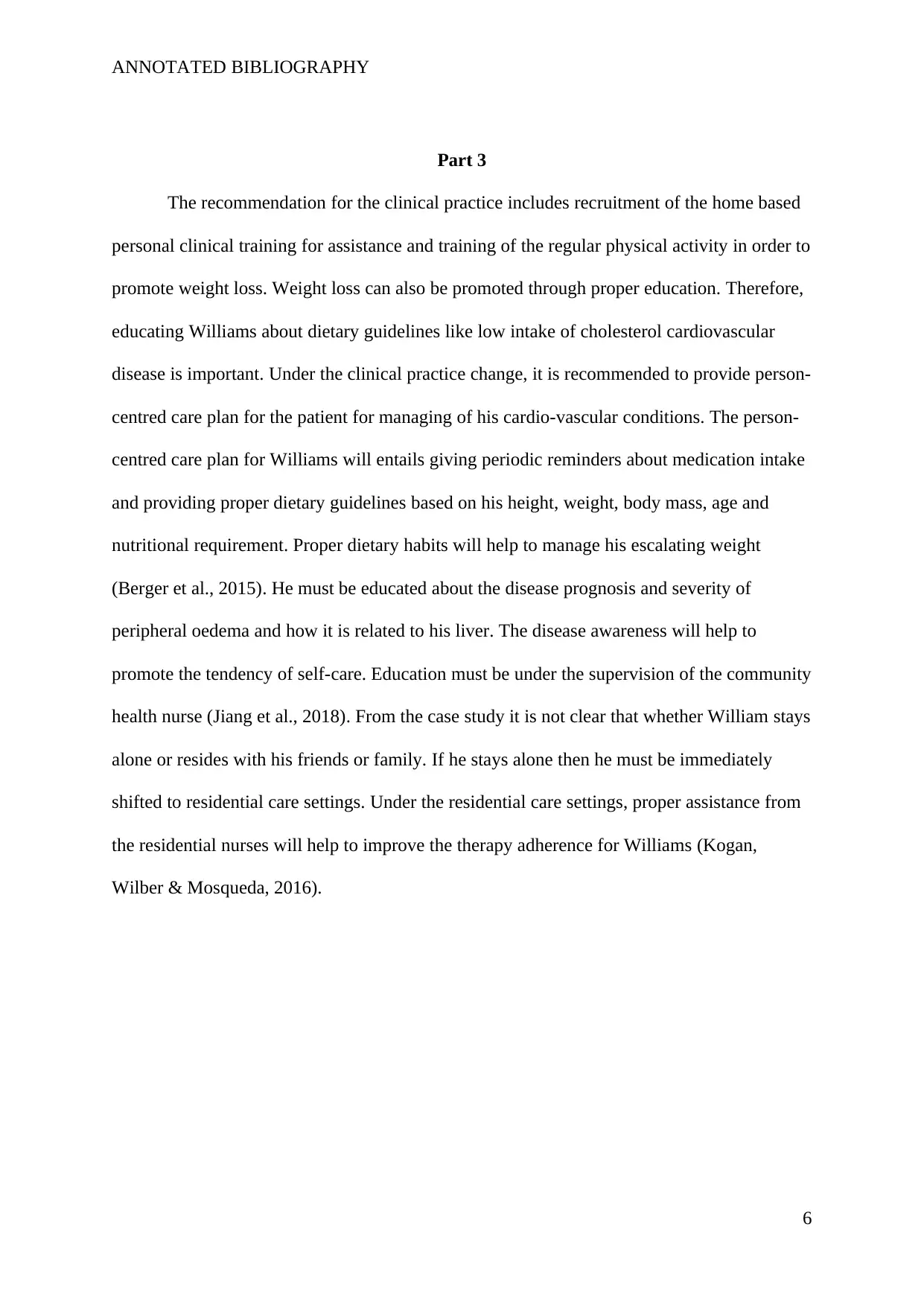
ANNOTATED BIBLIOGRAPHY
Part 3
The recommendation for the clinical practice includes recruitment of the home based
personal clinical training for assistance and training of the regular physical activity in order to
promote weight loss. Weight loss can also be promoted through proper education. Therefore,
educating Williams about dietary guidelines like low intake of cholesterol cardiovascular
disease is important. Under the clinical practice change, it is recommended to provide person-
centred care plan for the patient for managing of his cardio-vascular conditions. The person-
centred care plan for Williams will entails giving periodic reminders about medication intake
and providing proper dietary guidelines based on his height, weight, body mass, age and
nutritional requirement. Proper dietary habits will help to manage his escalating weight
(Berger et al., 2015). He must be educated about the disease prognosis and severity of
peripheral oedema and how it is related to his liver. The disease awareness will help to
promote the tendency of self-care. Education must be under the supervision of the community
health nurse (Jiang et al., 2018). From the case study it is not clear that whether William stays
alone or resides with his friends or family. If he stays alone then he must be immediately
shifted to residential care settings. Under the residential care settings, proper assistance from
the residential nurses will help to improve the therapy adherence for Williams (Kogan,
Wilber & Mosqueda, 2016).
6
Part 3
The recommendation for the clinical practice includes recruitment of the home based
personal clinical training for assistance and training of the regular physical activity in order to
promote weight loss. Weight loss can also be promoted through proper education. Therefore,
educating Williams about dietary guidelines like low intake of cholesterol cardiovascular
disease is important. Under the clinical practice change, it is recommended to provide person-
centred care plan for the patient for managing of his cardio-vascular conditions. The person-
centred care plan for Williams will entails giving periodic reminders about medication intake
and providing proper dietary guidelines based on his height, weight, body mass, age and
nutritional requirement. Proper dietary habits will help to manage his escalating weight
(Berger et al., 2015). He must be educated about the disease prognosis and severity of
peripheral oedema and how it is related to his liver. The disease awareness will help to
promote the tendency of self-care. Education must be under the supervision of the community
health nurse (Jiang et al., 2018). From the case study it is not clear that whether William stays
alone or resides with his friends or family. If he stays alone then he must be immediately
shifted to residential care settings. Under the residential care settings, proper assistance from
the residential nurses will help to improve the therapy adherence for Williams (Kogan,
Wilber & Mosqueda, 2016).
6
Paraphrase This Document
Need a fresh take? Get an instant paraphrase of this document with our AI Paraphraser
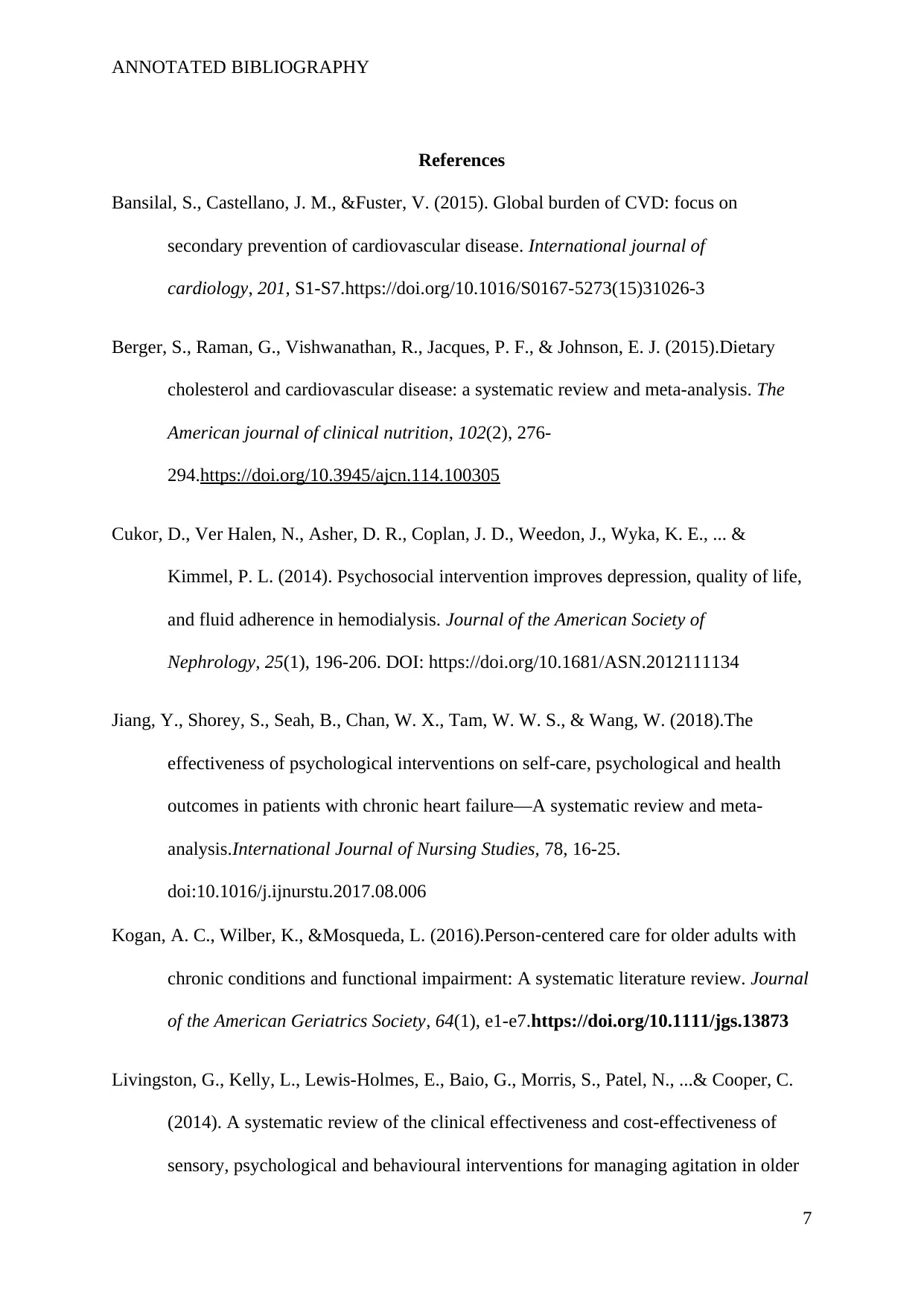
ANNOTATED BIBLIOGRAPHY
References
Bansilal, S., Castellano, J. M., &Fuster, V. (2015). Global burden of CVD: focus on
secondary prevention of cardiovascular disease. International journal of
cardiology, 201, S1-S7.https://doi.org/10.1016/S0167-5273(15)31026-3
Berger, S., Raman, G., Vishwanathan, R., Jacques, P. F., & Johnson, E. J. (2015).Dietary
cholesterol and cardiovascular disease: a systematic review and meta-analysis. The
American journal of clinical nutrition, 102(2), 276-
294.https://doi.org/10.3945/ajcn.114.100305
Cukor, D., Ver Halen, N., Asher, D. R., Coplan, J. D., Weedon, J., Wyka, K. E., ... &
Kimmel, P. L. (2014). Psychosocial intervention improves depression, quality of life,
and fluid adherence in hemodialysis. Journal of the American Society of
Nephrology, 25(1), 196-206. DOI: https://doi.org/10.1681/ASN.2012111134
Jiang, Y., Shorey, S., Seah, B., Chan, W. X., Tam, W. W. S., & Wang, W. (2018).The
effectiveness of psychological interventions on self-care, psychological and health
outcomes in patients with chronic heart failure—A systematic review and meta-
analysis.International Journal of Nursing Studies, 78, 16-25.
doi:10.1016/j.ijnurstu.2017.08.006
Kogan, A. C., Wilber, K., &Mosqueda, L. (2016).Person‐centered care for older adults with
chronic conditions and functional impairment: A systematic literature review. Journal
of the American Geriatrics Society, 64(1), e1-e7.https://doi.org/10.1111/jgs.13873
Livingston, G., Kelly, L., Lewis-Holmes, E., Baio, G., Morris, S., Patel, N., ...& Cooper, C.
(2014). A systematic review of the clinical effectiveness and cost-effectiveness of
sensory, psychological and behavioural interventions for managing agitation in older
7
References
Bansilal, S., Castellano, J. M., &Fuster, V. (2015). Global burden of CVD: focus on
secondary prevention of cardiovascular disease. International journal of
cardiology, 201, S1-S7.https://doi.org/10.1016/S0167-5273(15)31026-3
Berger, S., Raman, G., Vishwanathan, R., Jacques, P. F., & Johnson, E. J. (2015).Dietary
cholesterol and cardiovascular disease: a systematic review and meta-analysis. The
American journal of clinical nutrition, 102(2), 276-
294.https://doi.org/10.3945/ajcn.114.100305
Cukor, D., Ver Halen, N., Asher, D. R., Coplan, J. D., Weedon, J., Wyka, K. E., ... &
Kimmel, P. L. (2014). Psychosocial intervention improves depression, quality of life,
and fluid adherence in hemodialysis. Journal of the American Society of
Nephrology, 25(1), 196-206. DOI: https://doi.org/10.1681/ASN.2012111134
Jiang, Y., Shorey, S., Seah, B., Chan, W. X., Tam, W. W. S., & Wang, W. (2018).The
effectiveness of psychological interventions on self-care, psychological and health
outcomes in patients with chronic heart failure—A systematic review and meta-
analysis.International Journal of Nursing Studies, 78, 16-25.
doi:10.1016/j.ijnurstu.2017.08.006
Kogan, A. C., Wilber, K., &Mosqueda, L. (2016).Person‐centered care for older adults with
chronic conditions and functional impairment: A systematic literature review. Journal
of the American Geriatrics Society, 64(1), e1-e7.https://doi.org/10.1111/jgs.13873
Livingston, G., Kelly, L., Lewis-Holmes, E., Baio, G., Morris, S., Patel, N., ...& Cooper, C.
(2014). A systematic review of the clinical effectiveness and cost-effectiveness of
sensory, psychological and behavioural interventions for managing agitation in older
7
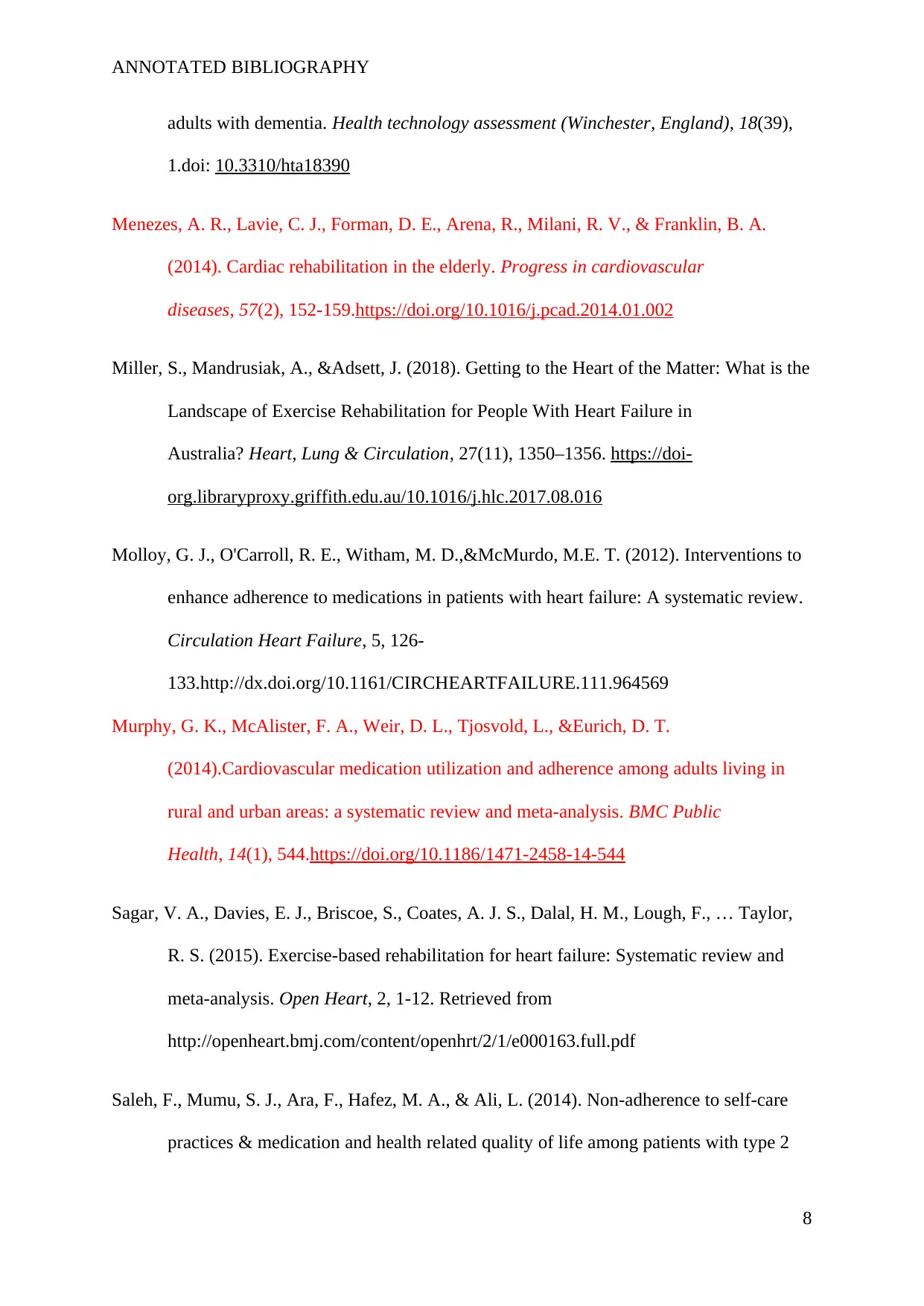
ANNOTATED BIBLIOGRAPHY
adults with dementia. Health technology assessment (Winchester, England), 18(39),
1.doi: 10.3310/hta18390
Menezes, A. R., Lavie, C. J., Forman, D. E., Arena, R., Milani, R. V., & Franklin, B. A.
(2014). Cardiac rehabilitation in the elderly. Progress in cardiovascular
diseases, 57(2), 152-159.https://doi.org/10.1016/j.pcad.2014.01.002
Miller, S., Mandrusiak, A., &Adsett, J. (2018). Getting to the Heart of the Matter: What is the
Landscape of Exercise Rehabilitation for People With Heart Failure in
Australia? Heart, Lung & Circulation, 27(11), 1350–1356. https://doi-
org.libraryproxy.griffith.edu.au/10.1016/j.hlc.2017.08.016
Molloy, G. J., O'Carroll, R. E., Witham, M. D.,&McMurdo, M.E. T. (2012). Interventions to
enhance adherence to medications in patients with heart failure: A systematic review.
Circulation Heart Failure, 5, 126-
133.http://dx.doi.org/10.1161/CIRCHEARTFAILURE.111.964569
Murphy, G. K., McAlister, F. A., Weir, D. L., Tjosvold, L., &Eurich, D. T.
(2014).Cardiovascular medication utilization and adherence among adults living in
rural and urban areas: a systematic review and meta-analysis. BMC Public
Health, 14(1), 544.https://doi.org/10.1186/1471-2458-14-544
Sagar, V. A., Davies, E. J., Briscoe, S., Coates, A. J. S., Dalal, H. M., Lough, F., … Taylor,
R. S. (2015). Exercise-based rehabilitation for heart failure: Systematic review and
meta-analysis. Open Heart, 2, 1-12. Retrieved from
http://openheart.bmj.com/content/openhrt/2/1/e000163.full.pdf
Saleh, F., Mumu, S. J., Ara, F., Hafez, M. A., & Ali, L. (2014). Non-adherence to self-care
practices & medication and health related quality of life among patients with type 2
8
adults with dementia. Health technology assessment (Winchester, England), 18(39),
1.doi: 10.3310/hta18390
Menezes, A. R., Lavie, C. J., Forman, D. E., Arena, R., Milani, R. V., & Franklin, B. A.
(2014). Cardiac rehabilitation in the elderly. Progress in cardiovascular
diseases, 57(2), 152-159.https://doi.org/10.1016/j.pcad.2014.01.002
Miller, S., Mandrusiak, A., &Adsett, J. (2018). Getting to the Heart of the Matter: What is the
Landscape of Exercise Rehabilitation for People With Heart Failure in
Australia? Heart, Lung & Circulation, 27(11), 1350–1356. https://doi-
org.libraryproxy.griffith.edu.au/10.1016/j.hlc.2017.08.016
Molloy, G. J., O'Carroll, R. E., Witham, M. D.,&McMurdo, M.E. T. (2012). Interventions to
enhance adherence to medications in patients with heart failure: A systematic review.
Circulation Heart Failure, 5, 126-
133.http://dx.doi.org/10.1161/CIRCHEARTFAILURE.111.964569
Murphy, G. K., McAlister, F. A., Weir, D. L., Tjosvold, L., &Eurich, D. T.
(2014).Cardiovascular medication utilization and adherence among adults living in
rural and urban areas: a systematic review and meta-analysis. BMC Public
Health, 14(1), 544.https://doi.org/10.1186/1471-2458-14-544
Sagar, V. A., Davies, E. J., Briscoe, S., Coates, A. J. S., Dalal, H. M., Lough, F., … Taylor,
R. S. (2015). Exercise-based rehabilitation for heart failure: Systematic review and
meta-analysis. Open Heart, 2, 1-12. Retrieved from
http://openheart.bmj.com/content/openhrt/2/1/e000163.full.pdf
Saleh, F., Mumu, S. J., Ara, F., Hafez, M. A., & Ali, L. (2014). Non-adherence to self-care
practices & medication and health related quality of life among patients with type 2
8
⊘ This is a preview!⊘
Do you want full access?
Subscribe today to unlock all pages.

Trusted by 1+ million students worldwide

ANNOTATED BIBLIOGRAPHY
diabetes: a cross-sectional study. BMC public health, 14(1),
431.https://doi.org/10.1186/1471-2458-14-431
9
diabetes: a cross-sectional study. BMC public health, 14(1),
431.https://doi.org/10.1186/1471-2458-14-431
9
1 out of 10
Related Documents
Your All-in-One AI-Powered Toolkit for Academic Success.
+13062052269
info@desklib.com
Available 24*7 on WhatsApp / Email
![[object Object]](/_next/static/media/star-bottom.7253800d.svg)
Unlock your academic potential
Copyright © 2020–2026 A2Z Services. All Rights Reserved. Developed and managed by ZUCOL.





